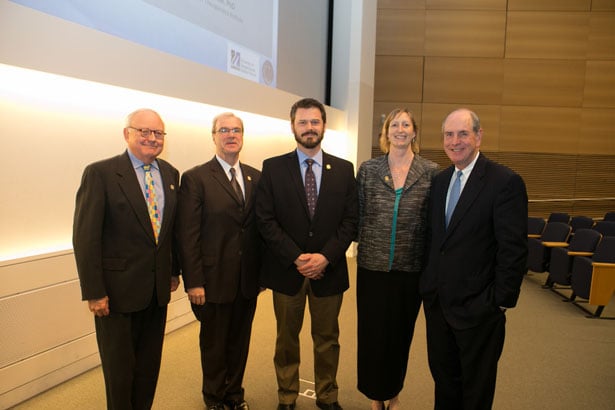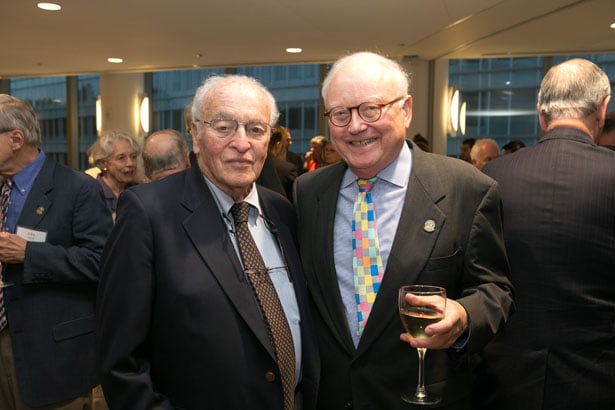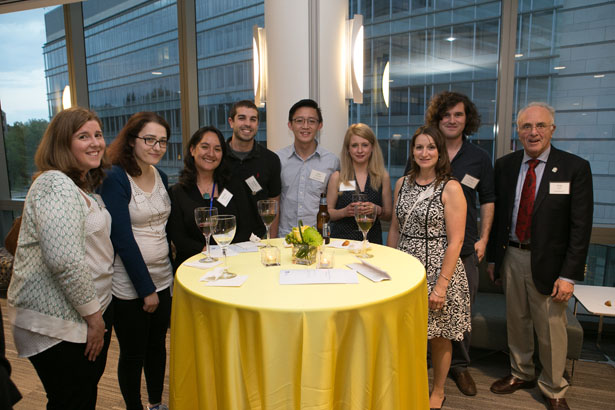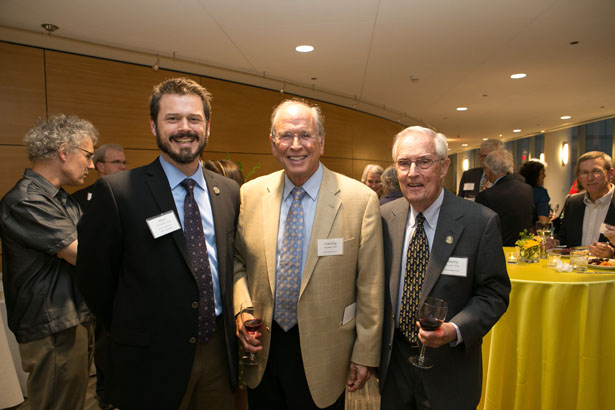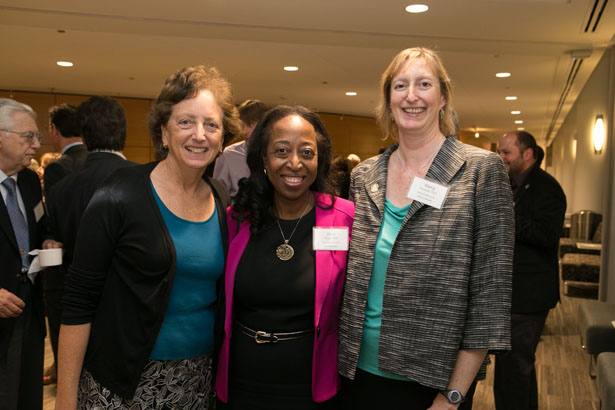The Hudson Hoagland Society celebrated a milestone anniversary at its 30th Annual Meeting on May 12: three decades of philanthropic support for scientific research. Thoru Pederson, PhD, the Vitold Arnett Professor of Cell Biology, professor of biochemistry & molecular pharmacology and scientific director of the Worcester Foundation for Biomedical Research when it merged with UMass Medical School in 1997, reminded the audience of HHS members, faculty, students and WFBR research grant recipients that the giving society’s origins were based on the understanding that biomedical research would lead scientists—and society—in unexpected directions, and that support for pioneering research was a necessity.
Dr. Pederson highlighted several early members of the HHS and the WFBR in photographs from previous annual meetings, including Warner Fletcher (recipient of the WFBR’s Hudson Hoagland Award in 2014), WFBR scientist M.C. Chang and Bob Cushman, who originally proposed the idea of an annual giving society to support the scientific work of minds like Chang, whose discoveries were precursors to the development of in vitro fertilization and oral contraceptives.
Chancellor Michael F. Collins gave an overview of the past year at UMMS, highlighting the importance of private philanthropy to research achievements and noting that the wildly popular “Ice Bucket Challenge” had raised around $150 million for ALS research—about the same amount as the NIH allocates to ALS research. The chancellor also reminded the audience of the two newest endowed chairs at UMMS, both of which were funded with WFBR support: two Worcester Foundation for Biomedical Research Chairs. One is held by Vivian Budnik, PhD, interim chair and professor of neurobiology; the other will be invested this fall, to be held by Gyongyi Szabo, MD, PhD, professor and vice chair of medicine and an internationally known researcher in the field of liver disease.
The chancellor also acknowledged seven new Worcester Foundation research grants, which each year support faculty proposals that allow talented scientists to explore new, groundbreaking ideas and serve to fill critical funding gaps while they await federal research grants. Recipients this year are:
- Jon Goguen, PhD, associate professor of microbiology & physiological systems, for β-Lactamase Prodrugs for Antibiotic-Resistant Infections;
- Elinor Karlsson, PhD, assistant professor of molecular medicine, for Behavioral Genetics and Neuropsychiatric Disorders in Mixed Breed Dogs;
- Paul Kaufman, PhD, professor of molecular, cell & cancer biology, for Regulation of Silenced Chromatin Localization;
- Tiffany Moore Simas, MD, professor of obstetrics & gynecology and pediatrics, for The Role of PAPP-A and the Adipose Tissue IGFBP-IGF Axis in Gestational Diabetes Mellitus;
- Madelyn Schmidt, PhD, associate professor of microbiology & physiological systems, for A New Strategy for HIV Vaccine Design;
- Evgeny Rogaev, PhD, professor of psychiatry, for Deep Analysis of Adaptive Immunogenic Repertoire in Alzheimer’s Disease;
- Wen Xue, PhD, assistant professor of molecular medicine, for Liver Cancer Gene Discovery and Detection Using CRISPR-Mediated Genome Editing.
The annual meeting also featured two talks.
Mary Munson, PhD, associate professor of biochemistry & molecular pharmacology, talked about new “doorways” for messenger RNA in and out of the nucleus—research supported by the inaugural WFBR Bassick Family Foundation Award. Her project was catalyzed by a discovery by Dr. Budnik, who published a paper detailing a new method of membrane transport in the journal Cell—the work was as unexpected as it was intriguing to Dr. Munson, who has spent her career understanding the nuances of how materials move through membranes. “If you looked at every textbook in the field circa 2012,” she said, “all of them would say that everything in and out of the nucleus moves through ‘nuclear pores’; but it turns out you can’t believe everything you read!”
Marc R. Freeman, PhD, Howard Hughes Medical Institute Investigator and vice chair and professor of neurobiology, spoke about his work funded by a Worcester Foundation research grant in 2005 (he projected the actual grant application up on the screen, to the delight of this research savvy audience). “I’m going to tell you a story built on Worcester Foundation funding,” he began, describing how the WFBR-funded project, which examined the mechanism by which nerve cells degenerated as a result of injury or disease and a surprising genetic pathway that inhibits that degeneration, surprised everyone in the field.
The Hudson Hoagland Society was founded in 1985 and continues to build upon now three decades of discovery and extraordinary advancements. Named in honor of the co-founder of the WFBR, the Hudson Hoagland Society supports basic scientific research that enables UMass Medical School scientists to make advances that have the potential to improve treatments and to speed the discovery of new medicines for countless diseases and afflictions.
